Durian: Uses, Benefits, Side Effects By Dr. Rajeev Singh
By Dr Rajeev Singh +2 more

Get,

to manage your symptom
Get your,


4 Cr+ families
benefitted

OTP sent to 9988776655



You’ve successfully subscribed to receive
doctor-approved tips on
Whatsapp

Get ready to feel your best.

Hi There,
Download the PharmEasy App now!!


Register to Avail the Offer
Send OTPBy continuing, you agree with our Privacy Policy and Terms and Conditions

Hi There,
Sign up on PharmEasy now!!
Trusted by 4 crore+ families

OTP sent to 9988776655



You have unlocked 25% off on medicines




Code: NU25
By Dr Rajeev Singh +2 more
Table of Contents
As children, when we went to the market with our mother to buy fruits and many of us were fascinated looking at the large spiky fruit. That fruit is none other than the king of fruits, the durian. The scientific name of durian is Durio zibethinus and belongs to the family Bombaceae. It is an exotic seasonal tropical fruit known for its unique taste and aroma. The word ‘durian’ is derived from the Malay word ‘Duri’, which signifies the thorns of the fruit. Durian has more than 200 varieties with distinct aromas, textures, and flavours. Durian is abundantly grown in Malaysia. It is also found in India, Indonesia, Sri Lanka, Vietnam, Philippines, Thailand, Malaysia, Madagascar, Hawaii, and Florida1. Let us look at some of the durian health benefits.
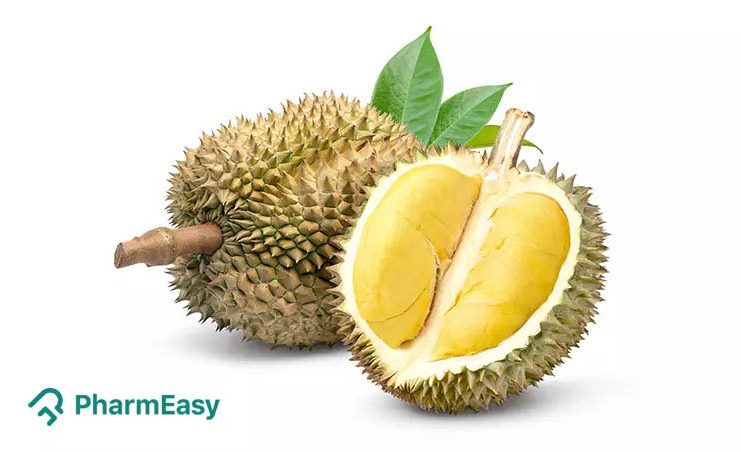
Durian may contain bioactive compounds like fatty acids, polyphenols, flavonoids, quercetin, apigenin, flavonols, anthocyanin, gallic acid, carotenoids, lutein, tannins, and ascorbic acid. Durian may have a high amount of energy compared to other tropical fruits2. Additionally, durian may contain the following nutritional components:
Several studies have shown that durian may have the following properties:
Based on my observations, the traditional uses suggest that durian fruit may have valuable health-promoting qualities. It is commonly associated with benefits such as immune system enhancement and promoting wound healing. However, further scientific study is required to back up such claims9.
Dr. Siddharth Gupta, B.A.M.S, M.D (Ayu)
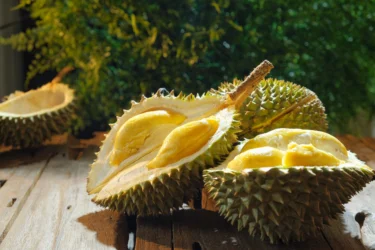
Durian may possess antioxidant properties due to the presence of bioactive compounds like polyphenols and flavonoids. Durian may show its antioxidant potential by deactivating harmful free radicals. Free radicals are atoms that damage the cells to cause diseases1,2. However, further studies are required to check if durian can help to manage oxidative stress in the human body.

Durian may have a low glycemic index when compared to other tropical fruits. The glycemic index is a value to measure how much a particular food raises the blood sugar level. The fibres present in durian may slow down digestion, slow down the conversion of carbohydrates to glucose and may help in lowering the glycemic index of the food2. However, further studies are required to check the effect of durian on humans. You must consult your doctor in case of abnormal sugar levels. Do not self-medicate.
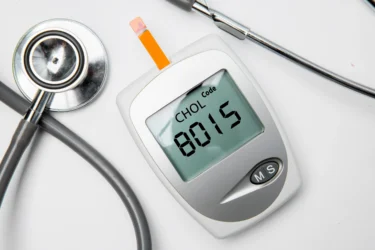
A study4 conducted on rats by Haurenkit et al. in 2007 showed a possible decrease in bad cholesterol levels and low-density lipoprotein (LDL)2. Additionally, esters like methyl propionate, ethyl propionate and propyl propionate may inhibit cholesterol synthesis. Further investigation is required to check the effect of durian on humans. However, you must check your cholesterol levels regularly and contact your doctor in case of high cholesterol levels.

Bioactive compounds like polyphenols present in durian may be beneficial for cancer due to their ability to relieve oxidative stress. In addition, these polyphenols may inhibit growth and kill cancer cells2. A study5 by Jayakumar et al. showed that durian might show its anti-proliferative effect (inhibit breast cancer cells) due to the presence of polyphenols. However, further studies are yet to be done on humans to check the effect of durian on humans. Therefore, you must seek medical help if you are diagnosed with cancer instead of self-medicating.
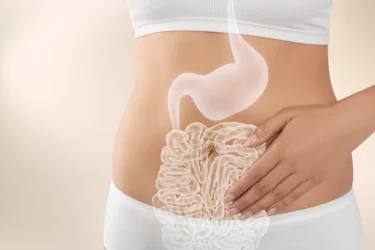
Durian may contain fibres which are beneficial for proper digestion. The fibre in durian is insoluble and it may help to control diarrhoea. Additionally, the fibres in durian may stimulate the peristaltic movement and the secretion of various enzymes required for digestion1. More studies are needed to check whether durian can help to enhance digestion. However, you must consult your doctor if you have any symptoms of digestive disorders.
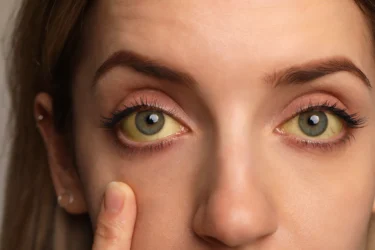
The leaves and roots of durian may be used in case of malaria. It may lower the temperature of the body due to its antipyretic effect. Further, durian may relieve cold, jaundice and phlegm (mucous)1. However, more research is needed to check if durian may be beneficial for malaria and jaundice. Therefore, you must consult your doctor if you have malaria or jaundice instead of self-medicating.
Though studies show the benefits of durian in various conditions, these are insufficient, and there is a need for further studies to establish the true extent of the benefits of durian on human health.
From what I have seen over the years, durian fruit might be helpful for people who have difficulty sleeping. Thus, it may have potential benefits for individuals experiencing insomnia9.
Dr. Rajeev Singh, BAMS
Various parts of durian fruit can be consumed in the following way:
You must consult a qualified doctor before taking durian in large quantities or any herbal supplements. Do not discontinue or replace an ongoing treatment of modern medicine with an ayurvedic/herbal preparation without consulting a qualified doctor.
The side effects of durian may be as follows:
You must immediately consult your doctor if you experience any side effects after consuming durian.
The following precautions must be taken before consuming durian:
It is advised to consult your doctor before consuming durian if you have any pre-existing diseases.
Also Read: Bilimbi: Uses, Benefits and Side Effects By Dr. Rajeev Singh
Durian may interact with the following drugs:
You must consult your doctor before consuming durian if you are undergoing medical treatment.
Also Read: Singhara (Water Chestnut): Uses, Benefits, Side Effects By Dr. Smita Barode
Durian may act against diseases like diabetes, cancer, malaria, and jaundice. It may also improve digestion and reduce cholesterol levels1,2,4,5,6. However, you must consult your doctor if you are diagnosed with any disease instead of self-medicating.
Durian may cause hyperkalaemia and allergic reactions, leading to anaphylaxis (severe allergic reactions in the body)7,8. It may also cause urticaria (itchy skin), nasal congestion, rhinorrhea (runny nose), hoarseness and vomiting. You must consult your doctor if you experience any side effects.
Durian may contain bioactive compounds like fatty acids, polyphenols, flavonoids, quercitin, apigenin, anthocyanin, gallic acid, carotenoids, lutein, tannins, and ascorbic acid. It may contain carbohydrates, fibres, proteins, vitamins, and fats. It may also contain minerals like magnesium, calcium, potassium, phosphorous, and iron3.
Durian may have a low glycemic index when compared to other tropical fruits. The flavonoids, polyphenols and dietary fibres present may lower blood sugar levels. You must consult your doctor in case of abnormal sugar levels1,2.
Paracetamol and alcohol may interact with durian. When durian reacts with paracetamol, blood pressure may be reduced. Durian may inhibit the absorption of alcohol.
Disclaimer: The information provided here is for educational/awareness purposes only and is not intended to be a substitute for medical treatment by a healthcare professional and should not be relied upon to diagnose or treat any medical condition. The reader should consult a registered medical practitioner to determine the appropriateness of the information and before consuming any medication. PharmEasy does not provide any guarantee or warranty (express or implied) regarding the accuracy, adequacy, completeness, legality, reliability or usefulness of the information; and disclaims any liability arising thereof.
Links and product recommendations in the information provided here are advertisements of third-party products available on the website. PharmEasy does not make any representation on the accuracy or suitability of such products/services. Advertisements do not influence the editorial decisions or content. The information in this blog is subject to change without notice. The authors and administrators reserve the right to modify, add, or remove content without notification. It is your responsibility to review this disclaimer regularly for any changes.
Comments

Leave your comment...
You may also like
Comments